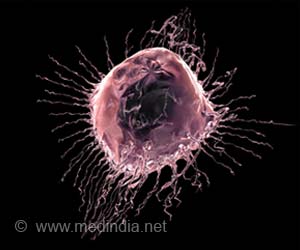A scientist at Purdue University has found a key protein process that can lead to the formation of tumors.
A scientist at Purdue University has found a key protein process that can lead to the formation of tumors.
Xiaoqi Liu, an assistant professor of Biochemistry, has claimed that an overabundance of the polo-like kinase 1 (Plk1) molecule during cell growth, as well as a shortage of the p53 molecule, could lead to tumor formation.Laboratory experiments have revealed that the Plk1 molecule indirectly attacks p53 in a process called ubiquitination.
"This provides the mechanism for how p53 loses its function in cancer cells. If we understand how the cancer forms, then we can create a more useful therapeutic approach to treating that cancer," said Liu.
At the time of cell growth, Plk1 uses its protein kinase activity called phosphorylation, which consists of adding a phosphate group to a protein called Topors, which binds itself to p53 molecules during the ubiquitination process.
Phosphorylation is basically an instruction from Plk1 to increase its ubiquitination activity, which kills p53 molecules.
According to Liu, p53 could be thought of as a protective force, which when gets destroyed by Topors, makes Plk1 stronger, allowing the cells to become cancerous.
Advertisement
Topors can also carry out a function called sumoylation, in which Topors binds to p53 molecules and creates more p53.
Advertisement
However, he said that they were still unclear as to why the Plk1 molecule chooses to initiate ubiquitination over sumoylation.
Liu said that the next step in the research would be to test different Plk1 inhibitors to see how they affect the phosphorylation process.
The study has been published in the early online publication of the Journal of Biological Chemistry.
Source-ANI
LIN










